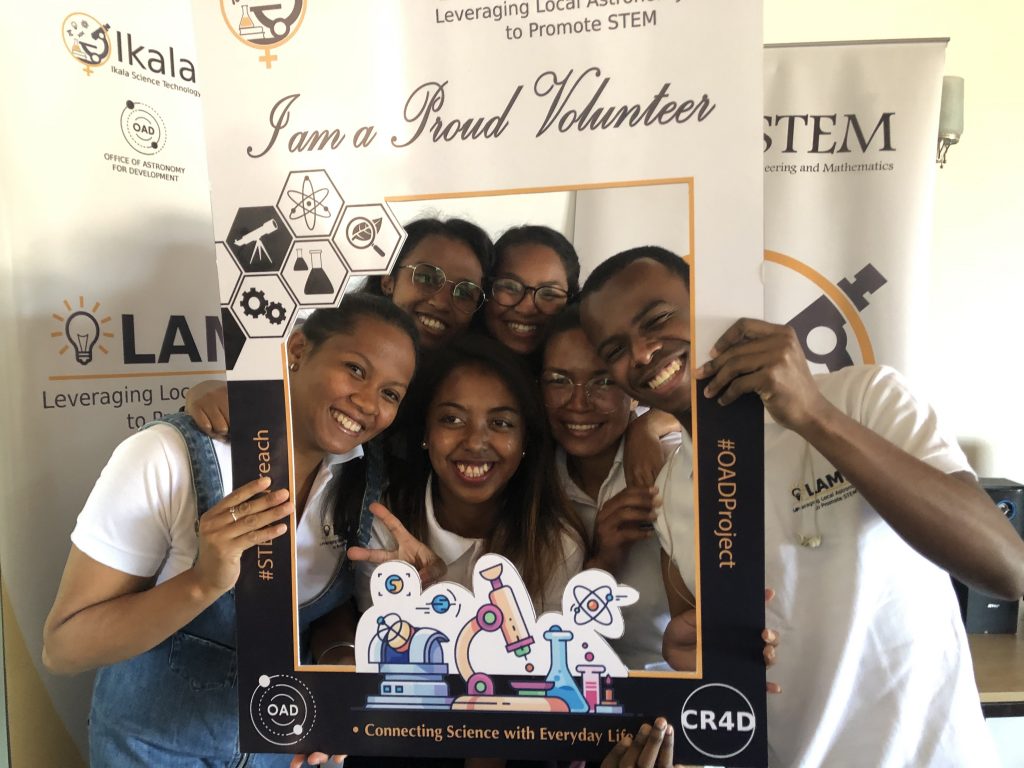A team of female scientists from Ikala STEM (Women in STEM – Madagascar) implemented LAMPS, a project to directly address the inequality between urban and rural Madagascar in accessing quality STEM education and to showcase the relevance of science in everyday life. Originally planned to be held in the AVN-host city of Arivonimamo, this OAD-funded project was adapted to a two-stage STEM education hybrid event, a one-week online activity (e-LAMPS) and school visits by LAMPS volunteers, due to the COVID-19 pandemic.
e-LAMPS online program
e-LAMPS was held in June 2021 under the theme “Science in our daily life” or “STEM, incontournable dans notre quotidien” in French. Primarily targeted at middle and high school learners as well as tertiary students, e-LAMPS was designed to substitute the planned in-person STEM Fair (cancelled due to the pandemic). The event consisted of online quizzes, games, talks etc, targeting Malagasy middle and high school learners all over the country. The Ikala STEM Facebook page and website as well TV (TVM, Dream’in, TV Plus Madagascar) and radio (Fivoarana in Arivonimamo, RNM reaching around the country) stations, printed newspapers (e.g. L’Express de Madagascar) and posters were used to ensure maximum reach for e-LAMPS. Seven STEM-focused NGOs partnered with Ikala STEM during this virtual component of the project. More than 100 high school learners participated in the e-Quiz Contest and at least 15,000 people were reached virtually throughout the event.
School visits
The second phase of LAMPS consisted of school visits in three middle and high schools in Arivonimamo in July 2021.
First, a half-day soft skills workshop was organized for the volunteers, aimed at strengthening their communication and presentation skills. By organizing hands-on STEM-based activities, science quizzes and motivational talks by young Malagasy women scientists during the visits, LAMPS volunteers were on a mission to improve the students’ motivation in education and STEM-related subjects. A total of 32 volunteers were mobilized to successfully run the program that was attended by at least 400 learners. Ikala STEM also took the opportunity to distribute COVID-19 kits to schools, teachers, and learners in Arivonimamo.
Volunteers were also trained and equipped with communication and science engagement skills during workshops and gatherings held in March and August 2021.
In spite of the uncertainties and challenges from COVID-19 restrictions, LAMPS was a success, conducted with funding from the OAD and CR4D, commitment from the incredible volunteers, close partnership with local and international STEM-focused NGOs, and the unwavering dedication and engagement of the core team. Through this project, Ikala STEM increased its visibility in the country and worked toward its mission: to empower the next generation of women in STEM.
Outcomes
It led to increased interest and knowledge in Astronomy (evidence: outreach and workshop events organized by the two astronomy associations partnering with Ikala STEM became oversubscribed after LAMPS. At least 10 volunteers will be joining Malagasy Astronomy & Space Science as amateur members. Teachers and learners from the visited schools are aware of the ongoing refurbishment of the old communication satellite into an Astro telescope). It also increased interest in STEM in general (evidence: learners from the schools have joined/intend to join the existing STEM club run sponsored by UNESCO in their schools. Ikala STEM is a UNESCO organization partner of that initiative.) and increased engagement in volunteering to promote quality STEM education by young adults (evidence: more than 85% of LAMPS Volunteers expressed their interest to join Ikala STEM as members in the next membership call. Queries via email and our Facebook page on how to join and/or volunteer with Ikala STEM have doubled between May-August 2021).
LAMPS provided more visibility of women in STEM and led to an improved understanding of the necessity of science in our daily life (evidence: most of the learners managed to give appropriate answers after listening to outreach talks by volunteers and viewing e-Learn posters on why science matters during the session).

